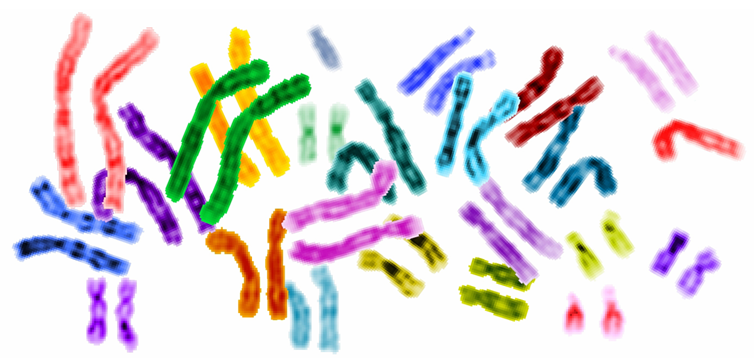Special topics of genetics
Triantafyllidis Alexandros, Drosopoulou Eleni
Modern technical analysis of genomes and genetic polymorphism will be presented during the course. In particular, the content of the course includes lectures related to genetic and physical maps of high resolution analysis, programs of prokaryotic and eukaryotic genomes, Comparative and Functional Genomics, Extranuclear Inheritance, and transposable elements.
Less
Modern technical analysis of genomes and genetic polymorphism will be presented during the course. In particular, the content of the course includes lectures related to genetic and physical maps of high resolution analysis, programs of prokaryotic and eukaryotic genomes, Comparative and Functional Genomics, Extranuclear Inheritance, and transposable elements.
Modern technical analysis of genomes and genetic polymorphism will be presented during the course. In particular, the content of the course includes lectures related to genetic and physical maps of high resolution analysis, programs of prokaryotic and eukaryotic genomes, Comparative and Functional Genomics, Extranuclear Inheritance, and transposable elements.
Syllabus

Instructors
Instructors:
Triantafyllidis Alexandros, http://www.bio.auth.gr/users/atriant
Drosopoulou Eleni, http://www.bio.auth.gr/users/edrosopo
Content Development Associate: Stiliani Minoudi
Course Syllabus
The analysis of Genomes. Modern Techniques of Genome Analysis and of Genetic Polymorphism. Main Genome sequencing programmes. Structural and Functional Genomics. The ExtraNuclear Genome. Transposable Elements.
Course Objectives/Goals
Training of students to methods and achievements of genomic science.
Prerequisites/Prior Knowledge
Basic knowledge of genetics, genetic engineering and molecular biology is required for better understanding of the course.
Target Group
Students / graduates of the School of Biology. Who is interested in the subject area of special topics on Genetics.
Textbooks
- Russel P. (Eλληνική έκδοση). (2009). iGenetics - Mια Mεντελική προσέγγιση. Aκαδημαϊκές Eκδόσεις Mπάσδρα & Σια· Aλεξανδρούπολη
- Watson J., Caudy A., Myers R., Witkoski J. (Ελληνική έκδοση) (2007). Ανασυνδυασμένο DNA. Ακαδημαϊκές Εκδόσεις Μπάσδρα και Σία. Αλεξανδρούπολη.
Bibliography
Text/books
- Introduction to Genomics, Second Edition, Arthur Lesk, 424 pages | 142 colour line, 96 colour half-tone | 265x195mm, 978-0-19-956435-4 | Paperback | 17 November 2011
- An Introduction to Ecological Genomics, Second Edition, Nico M. van Straalen and Dick Roelofs, 376 pages | 150 illustrations | 246x189mm, 978-0-19-959469-6 | Paperback | 27 October 2011
- Introduction to Conservation Genetics, 2nd Edition, textbook, Richard Frankham, Macquarie University, Sydney, Jonathan D. Ballou, Smithsonian Institution, Washington DC, David A. Briscoe, Macquarie University, Sydney, Date Published: March 2010
Bibliography
- THE BIG CHALLENGES OF BIG DATA13 JUNE 2013 | VOL 498 | NATURE | 25
- Genome 10K: A Proposal to Obtain Whole-Genome Sequence for 10 000 Vertebrate Species Journal of Heredity 2009:100(6):659–674
- The properties and applications of single-molecule DNA sequencing, Thompson and Milos Genome Biology 2011, 12 :217
Online readings
- http://www.genomeweb.com/ (news for genomes)
- http://www.genome.gov/10005107 (all the information for the ENCODE program)
- https://www.23andme.com/ Genetic analysis services
- http://www.genomesize.com/ Size genomes of organisms
- http://www.sequenom.com/ genotyping company
- http://www.ncbi.nlm.nih.gov/genome/ It includes images of chromosomes, genes and maps with links for further information at NCBI
Additional info
Acknowledgments
We warmly thank the Pearson Education Inc for granting the right to use educational material.
Instructors:
Triantafyllidis Alexandros, http://www.bio.auth.gr/users/atriant
Drosopoulou Eleni, http://www.bio.auth.gr/users/edrosopo
Content Development Associate: Stiliani Minoudi
The analysis of Genomes. Modern Techniques of Genome Analysis and of Genetic Polymorphism. Main Genome sequencing programmes. Structural and Functional Genomics. The ExtraNuclear Genome. Transposable Elements.
Training of students to methods and achievements of genomic science.
Basic knowledge of genetics, genetic engineering and molecular biology is required for better understanding of the course.
Students / graduates of the School of Biology. Who is interested in the subject area of special topics on Genetics.
- Russel P. (Eλληνική έκδοση). (2009). iGenetics - Mια Mεντελική προσέγγιση. Aκαδημαϊκές Eκδόσεις Mπάσδρα & Σια· Aλεξανδρούπολη
- Watson J., Caudy A., Myers R., Witkoski J. (Ελληνική έκδοση) (2007). Ανασυνδυασμένο DNA. Ακαδημαϊκές Εκδόσεις Μπάσδρα και Σία. Αλεξανδρούπολη.
Text/books
- Introduction to Genomics, Second Edition, Arthur Lesk, 424 pages | 142 colour line, 96 colour half-tone | 265x195mm, 978-0-19-956435-4 | Paperback | 17 November 2011
- An Introduction to Ecological Genomics, Second Edition, Nico M. van Straalen and Dick Roelofs, 376 pages | 150 illustrations | 246x189mm, 978-0-19-959469-6 | Paperback | 27 October 2011
- Introduction to Conservation Genetics, 2nd Edition, textbook, Richard Frankham, Macquarie University, Sydney, Jonathan D. Ballou, Smithsonian Institution, Washington DC, David A. Briscoe, Macquarie University, Sydney, Date Published: March 2010
Bibliography
- THE BIG CHALLENGES OF BIG DATA13 JUNE 2013 | VOL 498 | NATURE | 25
- Genome 10K: A Proposal to Obtain Whole-Genome Sequence for 10 000 Vertebrate Species Journal of Heredity 2009:100(6):659–674
- The properties and applications of single-molecule DNA sequencing, Thompson and Milos Genome Biology 2011, 12 :217
Online readings
- http://www.genomeweb.com/ (news for genomes)
- http://www.genome.gov/10005107 (all the information for the ENCODE program)
- https://www.23andme.com/ Genetic analysis services
- http://www.genomesize.com/ Size genomes of organisms
- http://www.sequenom.com/ genotyping company
- http://www.ncbi.nlm.nih.gov/genome/ It includes images of chromosomes, genes and maps with links for further information at NCBI
Acknowledgments
We warmly thank the Pearson Education Inc for granting the right to use educational material.
- Introduction
- Terminology
- Model organisms
- The increase of genome data
- A new era for genomics and human studies
- Examples of large genome studies
Keywords: Genome, Bioinformatics, Cost of sequencing, -omics, Model organisms
- Aims of study
- DNA – The carrier of genetic information
- Problems in sequencing and treatment methods
- Chromosomal, Genetic, physical maps and sequencing maps (and Exercises)
- New sequencing machines
- Assembling and storing data
- The future of analyses
- Finding genes in genomes sequences
Keywords: Genomic maps, polymorphism and errors in sequencing, hierarchical method of sequencing, whole genome approach, sequence tagged sites (STS), next generation sequencing
- Genomes of prokaryotic organisms
- Metagenomic programs
- Genomes of eukaryotic organisms
- Overall Genomic Analysis of Biodiversity
Keywords: The tree of life, arcaea, metagenomes, yeast, nematodes, Drosophila, Arabidopsis, rat, biodiversity
- The human genome
- Applications and Aims
- Conclusions
- Organization of genes
- Enhancement of genetic diversity
Keywords: Protein genes, RNA genes, gene organization, family genes, ENCODE project
- Comparative Genomics – An introduction
- Identification of gene function
- Study of synteny
- Genome duplications
- The minimal genome
- The origin of the eukaryotic genome
- Repetitive sequences
- Transposable elements
- Horizontal gene transfer
- Increasing the complexity of the proteome
Keywords: Orthlogs, paralogs, onologs, homologs genes, synteny,Whole genome duplication (WGD), Mycoplasma laboratorium, Synthetic Biology, repetitive DNA, horizontal gene transfer, complexity of the proteome
- Functional Genomics – An Introduction
- First-generation sequencing platforms
- Second-generation sequencing platforms
- Third-generation sequencing platforms
- Comparison of sequencing platforms
- DNA Arrays
- Mass spectrometer machines
Keywords: Automated sequencers, 454 Roche, Illumina, Pacific Biosciences, Ion Torrent, sequencing of a single cell, complexity of the genome, cost of sequencing, DNA microarrays, oligo arrays, diagnosis of diseases, Mass spectrometer
- mRNA analysis in genomics
- Analysis of SNP polymorphisms
- Others applications of NGS machines
- The use of high resolution platforms in proteomics
Keywords: serial analysis of gene expression, massive parallel signature sequence, semi-quantitative analyses, epigenetic analyses, biomonitoring, proteomics
- Extranuclear inheritance
- Mitochondrial DNA
- Chloroplastic DNA
- Origin of mitochondria and chloroplasts
- Criteria
- Examples
- Exclusions to maternal inheritance
- Mitochondrial diseases
- Epigenetic inheritance
- Infectious hereditary
- Maternal effect
Keywords: Extranuclear inheritance – mitochondria/ chloroplasts, Mitochondrial genetic code, Endosymbiotic theory, maternal inheritance, mitochondrial diseases, epigenetic changes, Gene dose compensation
- Introduction
- Transposable elements in prokaryotes
- Transposable elements in eukaryotes
- Biological significance of transposable elements
Keywords: Transposable elements, Bacterial Insertion sequences, Transposons, Plasmids of multiple resistance, Retrotransposons, Ρ-transposable elements, LINES, SINES
Open Academic Course

Num. of Visits : 5867
Num. of Hits : 31337

